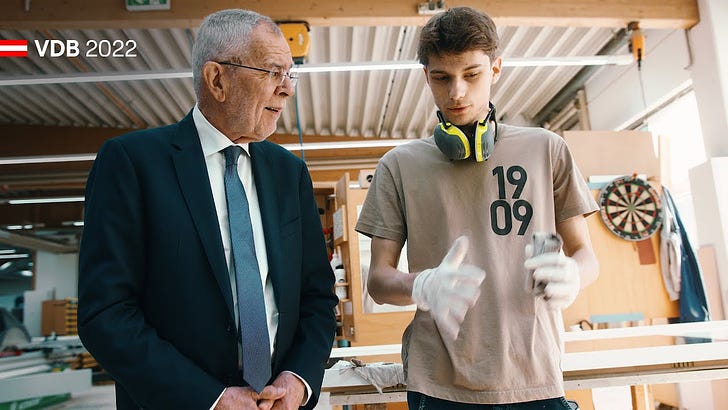He Will
Alexander Van der Bellen has confirmed that he will run for a second term as president with elections due in the fall
Servus!
The longest ‘Will he? Won’t he?’ saga in Austrian politics has finally come to an end with a definitive answer: He will. On Sunday, president Alexander Van der Bellen announced his intention to run for a second six-year term in office. “The corona pandemic, the Russian war of aggression in Ukraine, the related difficult situation for the economy, the climate crisis: our country, the whole of Europe, is experiencing unsettling times,” Van der Bellen said. “As such, I wish to offer anew my experience in service of our country.” Elections are expected in the fall.

Van der Bellen won his first term in office in most unusual circumstances. The first round of the last presidential election in April 2016 was won by far-right Freedom Party (FPÖ) candidate Norbert Hofer in a contest that saw the vote share of Austria’s two largest parties, the People’s Party (ÖVP) and Social Democratic Party (SPÖ), collapse to a combined 30.2 percent. Van der Bellen squared off against Hofer in the second round in May, winning by a narrow 50.3-49.7 percent margin. The far-right alleged irregularities in the postal vote count, and the Constitutional Court ordered the vote be redone; in December, Van der Bellen won again with 53.8 percent of the vote.
In retrospect, the nature of that election presaged a further six years of political chaos within which Van der Bellen constituted an island of calm and stability. During his time in office, Van der Bellen has presided over: Sebastian Kurz’s coup within the ÖVP, the collapse of the ÖVP-SPÖ coalition, new elections in October 2017, the formation of the ÖVP-FPÖ coalition, the Ibiza affair, Heinz-Christian Strache’s resignation, the vote of no confidence in Kurz’s government, the formation of a caretaker government, another round of elections in September 2019, Austria’s first ÖVP-Green coalition, Sebastian Kurz’s resignation, Alexander Schallenberg’s brief chancellorship, and Karl Nehammer’s rise to power. It is against the collapsing scenery of the Austrian Republic that Van der Bellen is selling his second term in office.
Van der Bellen’s confirmation that he’ll run again more-or-less clears the way for his re-election. There is a tradition or custom in Austria of incumbent presidents winning a second term should they choose to stand again: Adolf Schärf in 1963, Franz Jonas in 1971, Rudolf Kirchschläger in 1980, and Thomas Klestil in 1998. In 2010, the incumbent Heinz Fischer won re-election with almost 80 percent of the vote in a race in which the ÖVP chose not to stand a candidate. In a recent poll published by the Kurier, 63 percent of respondents indicated they would vote for Van der Bellen at the next presidential election.
This time around, the incumbent is also likely to face few opponents. In spite of having plausible candidates within their ranks like parliamentary president Wolfgang Sobotka or deputy parliamentary president Doris Bures, neither the ÖVP nor SPÖ look set to nominate an opponent to Van der Bellen. The NEOS, too, plan to endorse Van der Bellen, as will the Greens, the president’s political home. Previous candidates including Hofer and Irmgard Griss—Van der Bellen’s opponents in 2016—will sit this round out. With a field this thin, no wonder Van der Bellen promised a fair, transparent, and “short” presidential contest.
Someone will have to run against Van der Bellen in the fall, of course. There will likely be a joke candidate or two like musician Marco Pogo, leader of the satirical and as such unfunny Beer Party. But the only established party set to nominate a presidential candidate is the FPÖ. With Hofer out, the speculation is that current party leader Herbert Kickl will put himself forward, someone who nationwide is about as popular as syphilis. His candidature, however, would make the contest a very clear choice between the center and the extremes, norms and the abnormal, consistency or chaos.
Bis bald!
Thank you for subscribing to the Vienna Briefing. If you know someone who might be interested in reading this newsletter, consider sharing it with them today.
The Vienna Briefing is a free newsletter. If you would like to support my work, you can send me a tip via PayPal.
Kneissl Cuts Ties
Ex-foreign minister Karin Kneissl has stepped down from the board of directors of the Russian energy firm Rosneft. The move came days after the European Parliament recommended that the RT columnist be sanctioned due to her financial ties to Russia.
3-3-3
The ÖVP-Green coalition has finalized its plans to repeal the ban on men who have sex with men from giving blood. Going forward, irrespective of sexual orientation or gender identity, those who have had three different sexual partners within the last three months will be blocked from donating blood for three months.
Headscarves Allowed
Kindergarten pupils will not be subjected to a ban on headscarves, according to a new agreement reached between the federal government and the states. A previous attempt by the former ÖVP-FPÖ coalition to institute such a ban in elementary schools was ruled unconstitutional.



